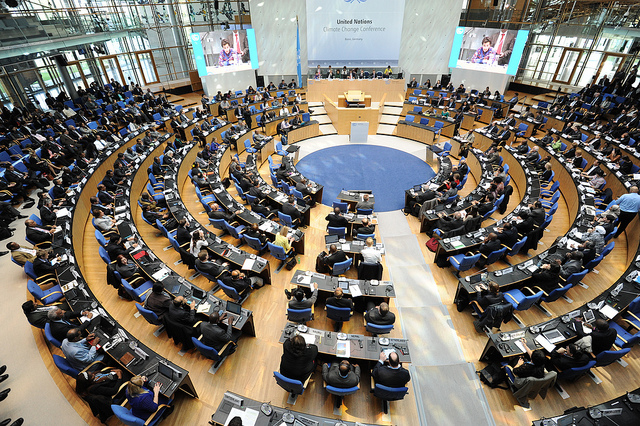Climate negotiators reconvene in Bonn, Germany for ADP 2-10, with just 10 days of negotiations remaining before COP 21 begins in Paris.
August is not a typical time for meetings under the United Nations Framework Convention on Climate Change (UNFCCC), but then 2015 is not a typical year in the world of climate negotiations. Starting today, August 31, the Ad-Hoc Durban Platform for Enhanced Action (ADP) convenes at the World Conference Centre in Bonn, Germany, until 4 September to continue negotiations on the new climate agreement which is to be adopted in Paris this December.
The ADP has met twice already this year and now just two, five day negotiation sessions remain before the 21st Conference of Parties (COP21) commences on November 30th. The first negotiation session of the year took place in Geneva in February. Under the guidance of new co-chairs Ahmed Djoghlaf of Algeria and Dan Reifsnyder of the USA, the Parties to the convention took time to pick up the pieces following frayed negotiations in Lima at COP 20. The co-chairs gave all Parties the opportunity to insert any considerations that they felt were missing in the text produced in Lima. This was based on the understanding that the Geneva session would be the last opportunity for Parties to propose new language for the agreement. By the time the session concluded, the Geneva Negotiating Text had swelled to 90 pages. This text remains the only official document in the process.
The Geneva session went some way to rebuilding trust between the Parties but by the time the APD met again in Bonn in June, concerns regarding the slow progress of negotiations were rising. The June session did little to alleviate these concerns as Parties embarked on a tedious line by line “streamlining” exercise in an effort to condense the text. Negotiation sessions ran until 9pm every night for two weeks but little substantive headway was made. Wearied by the streamlining process, the Parties asked the co-chairs to intervene and assist with consolidating the sprawling Geneva text.
And so, on July 24th the co-chairs produced a “tool” to assist Parties in the negotiations. The tool is an 83 page version of the Geneva Text. It has three parts: the first part contains provisions from the Geneva Text which are appropriate for inclusion in an agreement as they enjoy widespread support from the Parties; the second part contains provisions which the co-chairs feel do not need to be part of the Paris Agreement but instead can be handled under the usual business of the UNFCCC; and the third part which contains all other provisions around which there is not consensus and further negotiation is required.
If this is beginning to sound complex it’s because it is. There is much uncertainty around how negotiations will proceed in Bonn next week. It is likely that negotiators will be encouraged to focus their attention on part three of the co-chairs’ tool – the provisions that are currently “homeless” – in an effort to decide whether to place them within the new agreement or not. Yet concerns increase that the most significant areas of divergence are yet to be settled. For instance, Parties still need to decide upon how the new agreement will differentiate expectations of countries’ mitigation action. For developing countries, those most vulnerable to the impacts of climate change, certainty on the provision of climate finance to assist with their climate action has not been forthcoming from their developed country counterparts. The legal nature of the agreement has yet to be established.
These big issues require strong leadership to resolve. Now, not Paris, is the time for this leadership to come to the fore.
Follow the conversation on twitter:
#ADP2015 | #COP21 | #UNFCCC
Related Links
Live-streams from the various sessions at ADP 2-10
Climate Change Negotiators Meet in Bonn to Prepare for Paris Climate Summit


